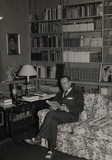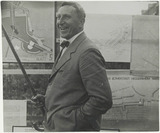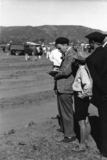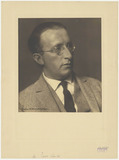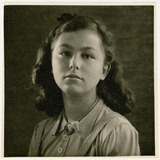Klaus Mann
An Autobiographical Chronicler of his TimeBorn on 18 November 1906Died on 21 Mai 1949WriterOf Thomas Mann’s six children, all of whom were active as writers, his eldest son, Klaus, left behind the most extensive work – and the most important from a literary standpoint. He published his first novel Der fromme Tanz [The Pious Dance] at the age of 19.
Thomas Mann
Power and Ineffectuality of the Nobel Laureate for LiteratureBorn on 6 June 1875Died on 12 August 1955WriterWith widely read novels like Buddenbrooks (1901) [Buddenbrooks (1924/1993)], Königliche Hoheit (1909) [Royal Highness (1916)] and Der Zauberberg (1924) [The Magic Mountain (1927/2005)], the later Nobel laureate Thomas Mann had gained a reputation in the first three decades of the 20th century as being, in the view of Marcel Reich-Ranicki, "the greatest stylist of German since Goethe’s death". The son of a merchant and senator from Lübeck, for a long time he presented himself as an apolitical writer, but transformed in the 1920s, moving away from conservatism by increasingly becoming an advocate of the Weimar Republic.
Ernst May
Born on 27 July 1886Died on 11 September 1970ArchitectErnst May's emigration to East Africa was a marked turning point in his career. The architect and town planner had previously worked in Silesia, Frankfurt am Main and the Soviet Union with great success. After his work in Russia, his way home was barred because the Nazis disparaged May's modern architecture.
Carl Meffert
“Profession: Émigré”Born on 26 March 1903Died on 27 December 1988Graphic designerCarl Meffert and his sister were born out of wedlock. When their mother died giving birth to a third child, the eleven-year-old Carl was sent to a state care institution where the young inmates had both to attend school and work.
Walter Mehring
Born on 29 April 1896 in Berlin, GermanyDied on 3 October 1981 in Zurich, SwitzerlandPoet, WriterAfter starting out in Dadaism, Walter Mehring rose at the beginning of the 1920s to become one of the most popular cabaret, song and lyric writers in Berlin. His lyrics were set to music, his satirical songs and chansons recited and sung on the famous stages.
Ludwig Meidner
Born 18. April 1884Died 14. Mai 1966Painter*** Please also visit the special exhibition Ludwig Meidner ***Ludwig Meidner achieved his artistic breakthrough in November 1912 with the exhibition of the Die Pathetiker artist group in Herwarth Walden's Berlin gallery Der Sturm. Meidner was consequently closely associated with literary expressionism: he created illustrations for all the renowned expressionist magazines, published his own texts and painted portraits of countless poets.
Erich Mendelsohn
Born on 21 March 1887Died on 15 September 1953ArchitectAfter some detours, Erich Mendelsohn eventually pursued his own career path despite the wishes of his parents. In 1912 he finished his studies in architecture in Munich.
Konrad Merz
Born on 2 April 1908Died on 3 December 1999WriterKurt Lehmann alias Konrad Merz came from a working class family; his father already died in 1914, the first year of World War One. Forced to earn his own living, he left school early.
Helga Michie
Born on 1 November 1921Actress, Painter, WriterHelga Michie was born in Linz on 1 November 1921. Her twin sister is the author Ilse Aichinger. Following their parents’ divorce, the girls moved with their mother to Vienna.
Ludwig Mies van der Rohe
Born on 27 March 1886Died on 17 August 1969Architect, DesignerIn Germany the number of viable jobs for him had declined since the assumption of power by the National Socialists and the closure of the Bauhaus, which Ludwig Mies van der Rohe was director of between 1932 and 1933. He could no longer equal his former successes such as the exhibition pavilion for the World Expo in 1929 in Barcelona.


